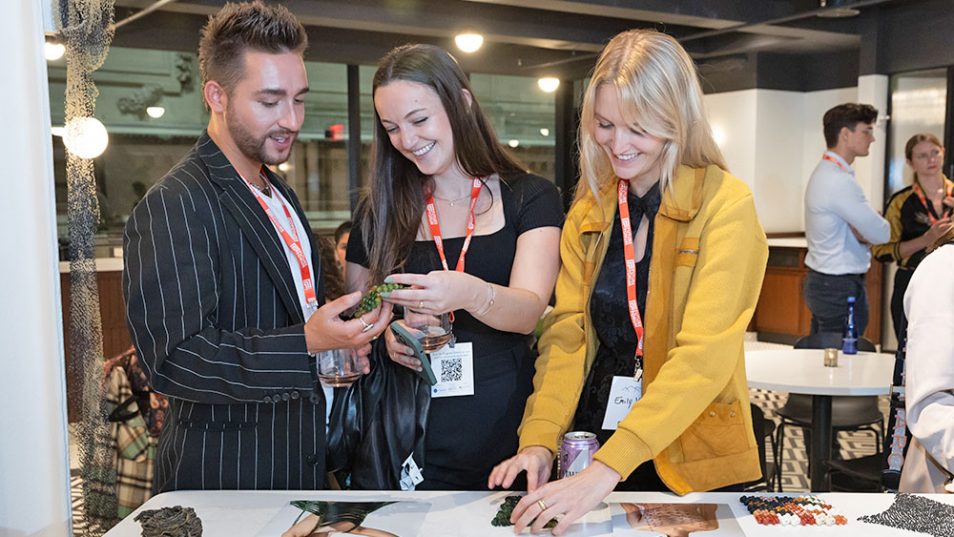In focus: The work of the DWIH New York in 2022
 © DWIH New York
© DWIH New York
The massive investment programs launched in the U.S. in 2022 created a momentum that was clearly felt in transatlantic dialog in the area of science and innovation, too. At the DWIH New York, the topics addressed ranged from innovations in the field of climate action to strengthening start-up culture.
Green hydrogen
Hydrogen produced from renewable energies is considered a key building block in the global energy transition. Germany is already engaged in collaboration with numerous countries around the world in this field. Exactly what form such partnerships should ideally take was the subject of the online talk “DSPOT – The Future is Green Hydrogen: Perspectives from Germany, Brazil, and the USA” on 14 April, organized jointly by the two DWIH New York and São Paulo. “For us, this was an excellent introduction to the DWIH focus topic ‘Sustainable Innovations’,” recalls Benedikt Brisch, Director of DWIH New York. “Firstly in terms of subject matter, but also from the point of view of effective international cooperation within the DWIH network itself. After all, a multi-pronged approach is becoming increasingly vital – especially in the area of climate action.”
A look ahead to the future
The climate crisis has long had a global impact, but it involves a number of other risks that are still difficult to assess in terms of their full extent. As such, it makes sense to develop effective methods that help prepare for different potential scenarios. One of these was presented at the workshop “The Future of Climate Action” on 17 June 2022. Under the direction of Dr. Max Jungmann, founder and CEO of the German sustainability consultancy Momentum Novum, participants looked at potential future paths for global climate action measures based on so-called “strategic foresight”. A conscious effort was made to ensure that the workshop was as interdisciplinary as possible, says DWIH Head of Programs Dr. Jan Lüdert: “It was fascinating to see that the questions asked about the future by an economist are completely different to those asked by a lawyer or a climate activist – and how enormously enriching it can be to merge these starkly differing perspectives.”
Promotion of start-ups
From a U.S. perspective, the German start-up scene was long regarded as being rather hesitant and too obsessed with detail. Those times are now over. At a bootcamp organized as part of the STEP USA University Program for start-ups and entrepreneurs by DWIH New York from 25 to 29 September 2022 in cooperation with the German-American Chamber of Commerce, the participating companies from Germany demonstrated not only a high level of subject-specific expertise but also the ability to present their ideas in a concise and appealing manner. The aim of the program is to specifically meet the needs of the fast-growing university start-up scene and facilitate access to the US market for German start-ups. One participant who found the program to be a resounding success was Jaan Brunken, co-founder of Wingfield – a company that is seeking to transform traditional tennis courts into “smart courts” using AI. “As a sports tech founder from Germany, expanding our company in the US was always a major goal, but it didn’t really feel feasible. Just a few months after STEP, we’ve now actually gone ahead and taken this step.”
Sustainable clothing
New York is one of the world’s foremost fashion hotspots: trends are set here that impact the industry far beyond national borders. In view of this, DWIH New York sought to promote transatlantic dialog between U.S. and German industry players – something that is urgently needed. According to United Nations figures, the fashion industry is responsible for around 10 per cent of greenhouse gas emissions worldwide. Due to ever shorter production cycles, enormous amounts of resources are needed, with entire ecosystems suffering damage as a result. Under the title “Fabricating the Future”, the DWIH’s FUTURE FORUM on 6 and 7 October 2022 was dedicated to new approaches in the world of fashion – from fair trade to the sustainable use of raw materials. “I believe we succeeded in providing insights into fascinating basic research that delves deeply into subjects such as resource consumption and environmental compatibility, and also presenting practical solutions geared towards direct application,” says DWIH Head of Programs Dr. Jan Lüdert.
Data for peace and development cooperation
Understanding the mechanisms that underlie global crises is indispensable when it comes to mastering the challenges of the future. Information from social media, satellite images and mobile phone data holds huge potential and could provide real-time indications of developments on an unprecedented scale. How researchers can productively tap into such data sources and apply them in the field of social science in particular was the topic of the DWIH panel discussion “Innovating Computational Social Science for Peace and Development”, which was held on 30 October 2022 as part of the German American Conference at the Harvard Kennedy School. The panelists were migration expert Marzia Rango of the UN Operations and Crisis Centre UNOCC, Professor Ingmar Weber, AI expert at Saarland University, and Dr. Martin Wählisch of the UN Department of Political and Peacebuilding Affairs. As DWIH Head of Programs Dr. Jan Lüdert is keen to point out: “The young Harvard tech elite are often very focused on a career in industry, so we wanted to show them that engagement in peace and development cooperation can be just as innovation-driven.”
